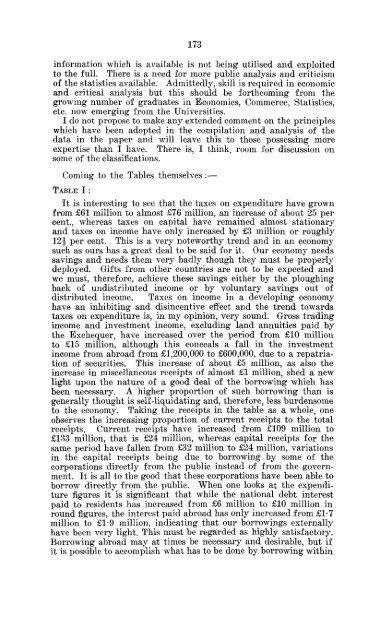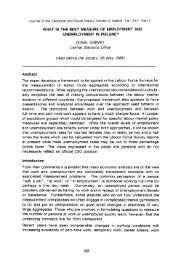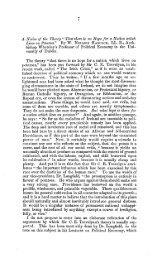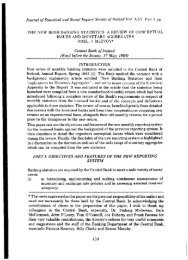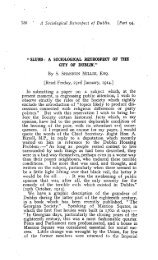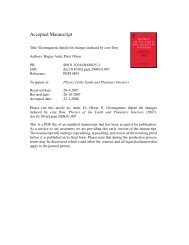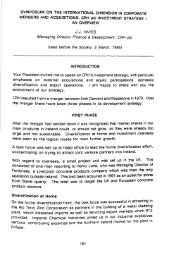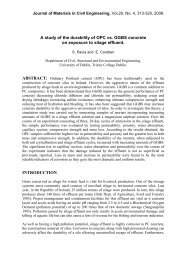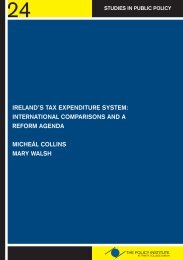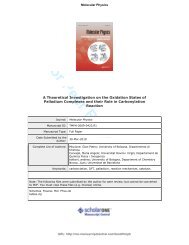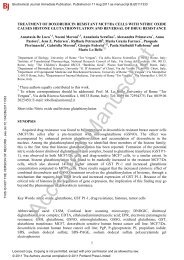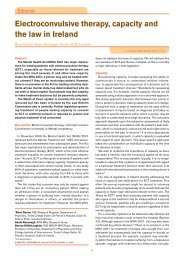An Analysis of Government Revenue and Expenditure in ... - TARA
An Analysis of Government Revenue and Expenditure in ... - TARA
An Analysis of Government Revenue and Expenditure in ... - TARA
Create successful ePaper yourself
Turn your PDF publications into a flip-book with our unique Google optimized e-Paper software.
173<br />
<strong>in</strong>formation which is available is not be<strong>in</strong>g utilised <strong>and</strong> exploited<br />
to the full. There is a need for more public analysis <strong>and</strong> criticism<br />
<strong>of</strong> the statistics available. Admittedly, skill is required <strong>in</strong> economic<br />
<strong>and</strong> critical analysis but this should be forthcom<strong>in</strong>g from the<br />
grow<strong>in</strong>g number <strong>of</strong> graduates <strong>in</strong> Economics, Commerce, Statistics,<br />
etc. now emerg<strong>in</strong>g from the Universities.<br />
I do not propose to make any extended comment on the pr<strong>in</strong>ciples<br />
which have been adopted <strong>in</strong> the compilation <strong>and</strong> analysis <strong>of</strong> the<br />
data <strong>in</strong> the paper <strong>and</strong> will leave this to those possess<strong>in</strong>g more<br />
expertise than I have. There is, I th<strong>in</strong>k, room for discussion on<br />
some <strong>of</strong> the classifications.<br />
Com<strong>in</strong>g to the Tables themselves :—<br />
TABLE I:<br />
It is <strong>in</strong>terest<strong>in</strong>g to see that the taxes on expenditure have grown<br />
from £61 million to almost £76 million, an <strong>in</strong>crease <strong>of</strong> about 25 per<br />
cent., whereas taxes on capital have rema<strong>in</strong>ed almost stationary<br />
<strong>and</strong> taxes on <strong>in</strong>come have only <strong>in</strong>creased by £3 million or roughly<br />
12^ per cent. This is a very noteworthy trend <strong>and</strong> <strong>in</strong> an economy<br />
such as ours has a great deal to be said for it. Our economy needs<br />
sav<strong>in</strong>gs <strong>and</strong> needs them very badly though they must be properly<br />
deployed. Gifts from other countries are not to be expected <strong>and</strong><br />
we must, therefore, achieve these sav<strong>in</strong>gs either by the plough<strong>in</strong>g<br />
back <strong>of</strong> undistributed <strong>in</strong>come or by voluntary sav<strong>in</strong>gs out <strong>of</strong><br />
distributed <strong>in</strong>come. Taxes on <strong>in</strong>come <strong>in</strong> a develop<strong>in</strong>g economy<br />
have an <strong>in</strong>hibit<strong>in</strong>g <strong>and</strong> dis<strong>in</strong>centive effect <strong>and</strong> the trend towards<br />
taxes on expenditure is, <strong>in</strong> my op<strong>in</strong>ion, very sound. Gross trad<strong>in</strong>g<br />
<strong>in</strong>come <strong>and</strong> <strong>in</strong>vestment <strong>in</strong>come, exclud<strong>in</strong>g l<strong>and</strong> annuities paid by<br />
the Exchequer, have <strong>in</strong>creased over the period from £10 million<br />
to £15 million, although this conceals a fall <strong>in</strong> the <strong>in</strong>vestment<br />
<strong>in</strong>come from abroad from £1,200,000 to £600,000, due to a repatriation<br />
<strong>of</strong> securities. This <strong>in</strong>crease <strong>of</strong> about £5 million, as also the<br />
<strong>in</strong>crease <strong>in</strong> miscellaneous receipts <strong>of</strong> almost £1 million, shed a new<br />
light upon the nature <strong>of</strong> a good deal <strong>of</strong> the borrow<strong>in</strong>g which has<br />
been necessary. A higher proportion <strong>of</strong> such borrow<strong>in</strong>g than is<br />
generally thought is self-liquidat<strong>in</strong>g <strong>and</strong>, therefore, less burdensome<br />
to the economy. Tak<strong>in</strong>g the receipts <strong>in</strong> the table as a whole, one<br />
observes the <strong>in</strong>creas<strong>in</strong>g proportion <strong>of</strong> current receipts to the total<br />
receipts. Current receipts have <strong>in</strong>creased from £109 million to<br />
£133 million, that is £24 million, whereas capital receipts for the<br />
same period have fallen from £32 million to £24 million, variations<br />
<strong>in</strong> the capital receipts be<strong>in</strong>g due to borrow<strong>in</strong>g by some <strong>of</strong> the<br />
corporations directly from the public <strong>in</strong>stead <strong>of</strong> from the government.<br />
It is all to the good that these corporations have been able to<br />
borrow directly from the public. When one looks at the expenditure<br />
figures it is significant that while the national debt <strong>in</strong>terest<br />
paid to residents has <strong>in</strong>creased from £6 million to £10 million <strong>in</strong><br />
round figures, the <strong>in</strong>terest paid abroad has only <strong>in</strong>creased from £1-7<br />
million to £1*9 million, <strong>in</strong>dicat<strong>in</strong>g that our borrow<strong>in</strong>gs externally<br />
have been very light. This must be regarded as highly satisfactory.<br />
Borrow<strong>in</strong>g abroad may at times be necessary <strong>and</strong> desirable, but if<br />
it is possible to accomplish what has to be done by borrow<strong>in</strong>g with<strong>in</strong>


